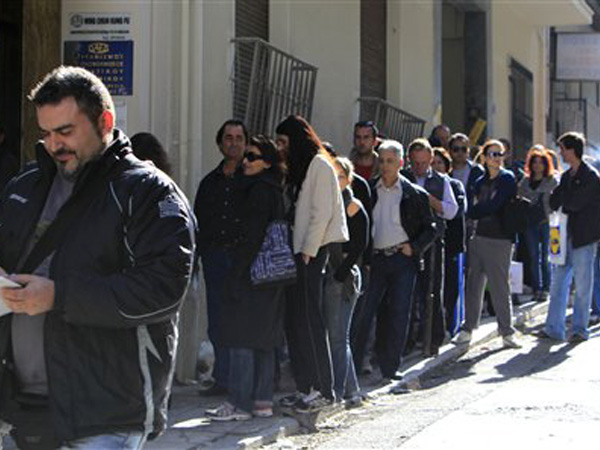Eurozone jobless down for first time in 2 years

Unemployed Greeks wait in a long line at a state labor office to collect benefit checks, in Athens, in this file photo. Greece and Spain have the highest unemployment rates in the eurozone, with both countries also mired in a youth unemployment crisis, according to figures released by Eurostat, the EU’s statistics office, Monday July 1, 2013, which reveals that unemployment across the 17 European Union countries that use the euro hit another all-time high in May 2013. AP
BRUSSELS — Further evidence emerged Wednesday that the eurozone economy is on the mend after struggling with a recession that’s seen unemployment edge toward the 20 million mark.
Figures from Eurostat, the EU’s statistics office, showed that the number of unemployed across the 17 European Union countries that use the euro fell by 24,000 in June to 19.27 million. That’s the first fall since April 2011 and adds to the weight of recent evidence that suggests the recession in the eurozone has — or is about to — come to an end.
The eurozone economy has been shrinking since the last quarter of 2011 as a raging debt crisis prompted many countries to pursue tough austerity policies that weighed on economic activity and confidence.
However, many analysts think figures next month will show the region may have eked out a modest growth during the second quarter, thanks mainly to a rebound in Germany, Europe’s biggest economy.
On top of that, other countries’ output — even for those at the forefront of Europe’s debt crisis — do not appear to be contracting on such a large scale as earlier on in the year. Figures this week showed that the Spanish recession nearly ended in the second quarter while there are hopes that even Greece may start growing again at the end of this year following a recession that’s wiped out around a fifth of the country’s output.
Article continues after this advertisementOne of the most damaging effects of the eurozone’s return to recession has been an inexorable rise in unemployment particularly of the young. Over the past year, unemployment across the region has increased by 1.13 million.
Article continues after this advertisementWednesday’s figures are only one month but they do provide some hope that there is now light at the end of the tunnel. In Spain, for example, the number of unemployed fell to 5.96 million from the previous month’s 6 million and that pulled the jobless rate down to 26.3 percent from 26.4 percent.
Overall, the unemployment rate in the eurozone was also lower than expected — though at a record high. At 12.1 percent in June, it’s unchanged on the previous month following a downward revision to May’s original 12.2 percent estimate.
Separately, Eurostat reported that consumer price inflation in the eurozone was unchanged at 1.6 percent in the year to July, in line with expectations. Though inflation remains below the European Central Bank’s target of keeping annual price rises just below 2 percent, rate-setters are expected to keep the bank’s main interest rate unchanged at the record low of 0.5 percent following the conclusion of their monthly policy meeting on Thursday.